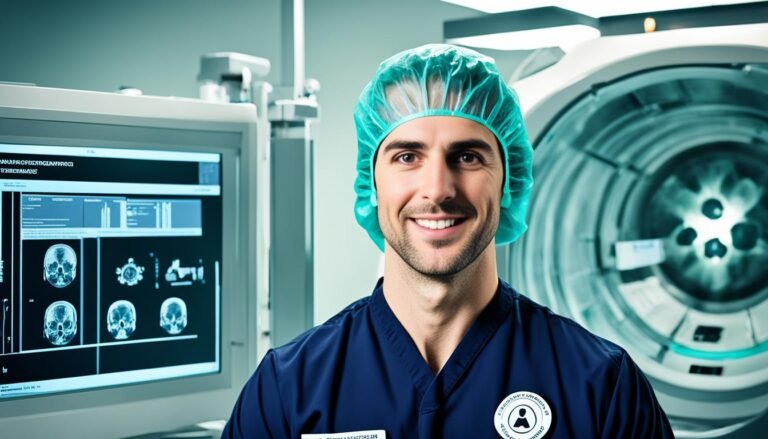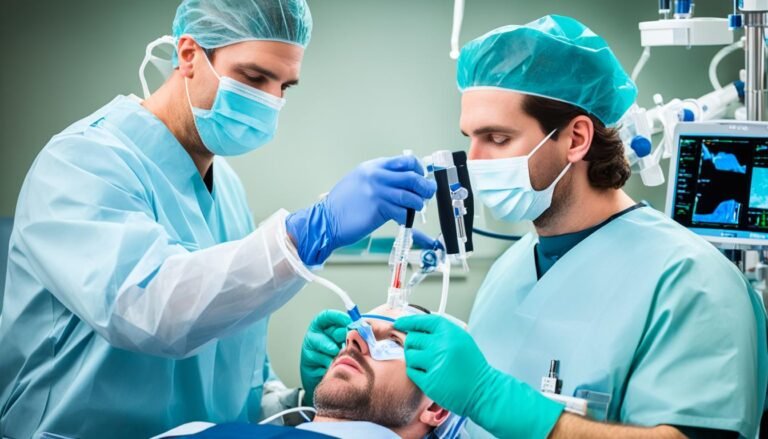What is a PhD in Allied Healthcare?
Have you ever thought about what a PhD in Allied Healthcare involves? Is it like other healthcare degrees or is it special in some way? This article will dig into the world of a PhD in Allied Healthcare. We will find out what makes it different and exciting. Get ready to learn about this high-level degree.
Key Takeaways:
- A PhD in Allied Healthcare is an advanced healthcare degree program that promotes interdisciplinary knowledge and collaboration.
- Graduates of this program are prepared for research faculty positions in allied health academic programs.
- Specializations within this program include areas such as aging, biomechanics, cancer, musculoskeletal conditions, and pediatrics.
- Earning a PhD in Allied Health unlocks career growth, research opportunities, and increased earning potential.
- The curriculum focuses on specialization, research, and teaching skills in the chosen discipline.
Benefits of a PhD in Allied Health
Getting a PhD in Allied Health does more than just add to what you know and can do. It brings many benefits that can really change your career and help you grow professionally.
Career Growth and Research Opportunities
One big plus of holding a PhD in Allied Health is the chance for many career paths. You get the skills and credentials to go after teaching and leadership roles in healthcare.
Choosing a specific healthcare area to focus on, like aging or cancer, helps you become an expert. You then help grow the knowledge in that field.
“A PhD in Allied Health offers an exceptional chance to become leaders in healthcare academia, conducting innovative research and shaping the future of healthcare. It opens doors to influential positions and establishes individuals as experts in specialized healthcare domains.”
Advanced Positions and Increased Earning Potential
With a PhD in Allied Health, you can move up in your career quicker and earn more. Your strong research and thinking skills put you in good standing for top jobs in health or education.
Having this PhD makes you stand out to employers. They see you as someone who can do both deep healthcare research and solve tough problems. You help your workplace grow and get better.
Recognition and Influence
A PhD in Allied Health boosts how others see you in the healthcare world. You become well-known and in demand for the knowledge you share.
As a PhD holder, you get to shape health policies and lead new studies. Your work makes healthcare better for patients and helps the whole field progress.
Career Options with a PhD in Allied Health
A PhD in Allied Health opens many career paths for graduates. It lets people work in education and the healthcare field. There are several exciting careers for those with a PhD in Allied Health:
1. Research Faculty Positions in Academic Institutions
Graduates with a PhD in Allied Health can work in research. They can lead teams and help shape healthcare’s future. By doing new research, they make a big difference in the field.
2. Healthcare Leadership Roles
These individuals understand healthcare well. They’re great for leading in the industry. They can make healthcare better for patients and communities. This can be through managing programs or creating new policies.
3. Healthcare Consulting
A PhD in Allied Health can lead to a job as a healthcare consultant. These consultants help hospitals and other health groups run better. Their skills are very valuable in this role.
4. Policy-Making and Administration
With a PhD in Allied Health, you can work on healthcare policies. You might help create new rules or manage healthcare organizations. This work directly impacts patient care and well-being.
These are just some careers for PhD holders in Allied Health. There’s a lot you can do, from research to helping shape healthcare policies. Having this degree means you can really change healthcare for the better.
Allied Health PhD Curriculum
The PhD in Allied Health is all about diving deep into health. It gives students a solid start in research and their chosen healthcare field. They learn through classes, projects, and real-world experiences. This helps them succeed in their careers later on.
Topics like rehab, disability, and tech to help are covered. The classes show how different healthcare methods work. This helps students get a grip on what really matters for healthcare results.
Specialization and Discipline Focus
Students can pick a special path within rehab sciences. This makes them experts in how their area boosts health and helps patients better.
“The program helps students lead in their expertise, from aging to pediatrics,” says Dr. Sarah Thompson, Allied Health PhD Director at XYZ University.
Research and Innovative Project Design
Research is key in the program. Students are taught to make and lead fresh studies. They get how to gather data and study it, which is how real healthcare insights are born.
“Using proof is vital,” Dr. Thompson shares. “It guides new healthcare directions. We push students to think big, challenge norms, and find new ways to solve healthcare issues.”
Dissemination of Research Findings and Teaching Skills
PhD students learn to share their study’s results well. This means writing papers, giving talks, and appearing in top journals. They also get a shot at teaching. This readies them to pass their wisdom to others.
“We want our grads to be experts who also talk and teach well,” Dr. Thompson says.
Extra courses let students explore more topics. They might delve into healthcare rules, leading teams, or ethical debates in studies.
Example Table:
| Course | Description |
|---|---|
| Theories and Models in Rehabilitation Sciences | An introduction to the main theories and models in the field. Prepares students for their own research and work. |
| Specialization in Biomechanics | Focuses on the basics of biomechanics and its healthcare use. Great for those interested in body movements. |
| Research Methods in Allied Health | Teaches the basics of researching in healthcare. Includes how to collect data and analyze it. |
| Advanced Data Analysis in Rehabilitation Sciences | Digs deep into complex data analysis for healthcare. Focuses on rehab sciences. |
| Teaching Practicum | Hands-on teaching experience for students. They help with courses or lead seminars. |
A PhD in Allied Health blends deep research, specialization, and teaching. It gives grads what they need for an amazing healthcare career. They can go into teaching, leading studies, or heading teams.
Doctoral Research in Healthcare
A PhD in Allied Health lets students dive deep into healthcare research. They learn to improve patient outcomes through knowledge advancement. As part of the program, they choose an area to specialize in, like aging or pediatrics.
This focused research allows students to explore their interests deeply. They come up with new ideas and methods. Their work can change how healthcare is practiced and policy is shaped, adding to the industry’s innovation.
Doing this kind of research is a chance to add to our knowledge in a field. The outcomes can change healthcare for the better. Researchers might find new treatments or question old beliefs, proposing fresh ideas for health issues.
Advancing Healthcare Practices
Doctoral healthcare research aims to make healthcare better. Researchers check the effectiveness and safety of treatments. They can also dive into the causes of diseases, helping to find new cures.
They also look for new ways to care for patients. This can include suggesting better health models or checking how treatments affect patients. Their work helps improve how healthcare is delivered.
Research is the foundation upon which healthcare advancements are built. It empowers healthcare professionals to provide the best possible care to patients, informed by the latest knowledge and evidence. Doctoral research is a critical component in this journey toward continuous improvement and excellence in healthcare.
Research in healthcare isn’t just about what you know. It’s about learning skills that make you a better problem solver and thinker. These skills are useful in academia and the job market, too. They learn to design studies, analyze data, and share their findings in scientific ways.
In essence, doctoral research in healthcare is key to an Allied Health PhD. It lets students push healthcare forward and gain important skills. Their efforts change how we take care of people, bringing innovation and improvement to the field.
Healthcare Leadership PhD
A PhD in Allied Health helps people become leaders in healthcare. This high-level education focuses on leading and managing healthcare programs. It’s more than just learning about health. Graduates lead healthcare initiatives to make patient care better.
This PhD program is about doing research and choosing a field to study. It helps students become leaders who make wise choices and improve patient care. After earning their PhD, students can shape healthcare policies. They help advance how healthcare works and find new ways to deliver care.
In this PhD, students take courses and do research. They also get real-world experience. This mix helps them learn about healthcare planning, policies, and systems. They see how different parts of healthcare connect. And they learn to work in complex healthcare settings.
Key Skills Developed in a Healthcare Leadership PhD Program:
- Strategic thinking and decision-making in healthcare
- Effective communication and teamwork across healthcare fields
- Research design, use, and analysis
- Healthcare regulations and rules
- Leading healthcare programs and projects
“A healthcare leadership PhD boost your skills to change and better healthcare. After studying a lot and getting focused, grads can lead and influence the future health world.”
Those with a PhD can lead health groups or big systems. Or they can create health policies and do important research. They have the knowledge to transform healthcare. Their work betters patient care. And it shapes how we get healthcare in the future.
| Benefits of a Healthcare Leadership PhD | Career Paths |
|---|---|
| 1. Enhanced leadership skills | 1. Healthcare executive |
| 2. Deeper understanding of healthcare systems | 2. Healthcare consultant |
| 3. Research expertise and contribution to evidence-based practices | 3. Healthcare policy analyst |
| 4. Expanded career opportunities in healthcare leadership | 4. Healthcare program director |
| 5. Influence on healthcare policy and decision-making | 5. Healthcare research faculty |
Doctoral Studies in Healthcare Management
A PhD in Allied Health is great for advanced healthcare degrees. It’s also top for doctoral studies in healthcare management. This program gives students strong skills in leading and managing healthcare groups. It combines healthcare leadership with solid research.
Graduates can handle tough healthcare challenges. They bring new strategies to life. These leaders blend research skills with healthcare management principles. This helps make healthcare better for everyone.
Benefits of Pursuing a PhD in Healthcare Management
Getting a PhD in Healthcare Management has lots of pluses:
- Specialized Expertise: You’ll dive deep into healthcare management theories and practices.
- Research Proficiency: The program focuses on research methods for top-notch, evidence-based studies.
- Leadership Development: You’ll build strong leadership, thinking, and decision-making skills.
- Career Advancement: It opens up better jobs in healthcare admin, consulting, or policy-making.
Research Opportunities in Healthcare Management
Doctoral programs offer chances to do impactful research. This helps add to what we know and solve important healthcare issues. Students look into systems, how well organizations work, and healthcare policies.
“Research drives better healthcare practices. Doctoral studies let students find new ways to make a real difference.” – Dr. Jane Mitchell, Healthcare Management Expert
By looking at real cases, doing careful analyses, and suggesting solid fixes, students can better patient care and healthcare results.
Advanced Opportunities in Allied Healthcare
Getting a PhD in Allied Health boosts your career in healthcare. It helps you lead, research, and teach in healthcare. You can help create evidence-based practices to better patient care and influence the future of healthcare.
A PhD in Allied Health prepares you well. It helps you make a big difference in healthcare through your research, teaching, and leading. You enhance healthcare by your knowledge and experience.
The Value of Leadership
Having a PhD in Allied Health makes you ready for leadership. You can lead healthcare organizations and projects. With your deep healthcare knowledge, you make decisions that help patients.
Healthcare leaders with a PhD can change policies and innovate. They ensure that patients get top-notch care. They use their research to improve healthcare.
Research and Education
A PhD in Allied Health lets you excel in research and teaching. As a researcher, you can bring new knowledge to healthcare and help patients further. You might focus on areas such as biomechanics or pediatrics.
Their research can focus on specific areas such as aging, biomechanics, cancer, musculoskeletal conditions, or pediatrics within the field of Rehabilitation Sciences.
You also get to educate future healthcare professionals. By teaching and guiding students, you help shape the future of healthcare. You make sure the next generation is skilled and caring.
Advancements in Careers
Earning a PhD in Allied Health makes you a standout. It shows your expertise and commitment. This makes you valuable in academia, healthcare, and research settings.
With your advanced skills, you can achieve high career goals. You might influence policies or lead innovations. You can improve healthcare and patient lives.
Conclusion
A PhD in Allied Health opens many doors in the healthcare realm. It equips grads to teach, lead in healthcare, and be experts in certain fields. This program outfits you to excel in various roles.
With this degree, you can push healthcare boundaries. You’ll be prepared to do intense research and bring new ideas to the healthcare world. You’ll play a vital role in its future.
Having a PhD in Allied Health means you can make real change. You can help patients more, shape healthcare’s future directions, and even influence its policies. The potential for impact is huge.
FAQ
Q: What is a PhD in Allied Healthcare?
A: A PhD in Allied Healthcare is a high-level program. It links many healthcare fields for better knowledge sharing. It prepares people for jobs like teaching in health programs. You can specialize in areas like Aging or Pediatrics.
Q: What are the benefits of obtaining a PhD in Allied Health?
A: Holding a PhD in Allied Health means more job and research chances. You could lead research teams or be a top health teacher. You’ll also be skilled in one healthcare topic. This makes you stand out for better jobs and pay.
Q: What career options are available with a PhD in Allied Health?
A: With your PhD, many career paths open up. You could teach or lead research in universities. Or lead health projects that help patients. There are also jobs in guiding health policies and running healthcare systems.
Q: What does the curriculum for a PhD in Allied Health involve?
A: In this PhD, you’ll focus on research and your healthcare interest. You’ll learn about rehab, disabilities, and tech. The program also teaches how to lead research projects, share your findings well, and be an expert teacher.
Q: What does doctoral research in healthcare entail?
A: Doing a PhD means doing new healthcare research. This lets you add to healthcare knowledge in your special area. You could study things like how to help older people or kids with health problems. Your work can make healthcare better for everyone.
Q: What is a Healthcare Leadership PhD?
A: A healthcare leadership PhD mixes healthcare and research with management skills. It teaches you to lead well in the healthcare field. After, you could help shape how healthcare is managed, making it more effective.
Q: Are there doctoral studies available in healthcare management?
A: Yes, you can get a doctorate in healthcare management. This PhD mixes health leadership with deep research. It trains you to lead and manage health organizations well. You get the skills to come up with new, effective ways to manage healthcare.
Q: What are the advanced opportunities in allied healthcare with a PhD?
A: A PhD in Allied Health leads to top jobs in healthcare. You can teach, research, or shape healthcare policy and practices. It makes you a key player in health programs. This degree helps you stand out in your career.
Source Links
- https://alliedhealth.ouhsc.edu/Prospective-Students/Academic-Programs/Allied-Health-Sciences/PhD-in-Allied-Health-Sciences-with-Specialization-in-Rehabilitation-Sciences
- https://graduate.ouhsc.edu/Programs/PhD-Programs/Allied-Health-Sciences-Rehabilitation-Sciences
- https://www.yu.edu/Advising/Stern-Academic-Advising/prehealth/allied-health-careers







